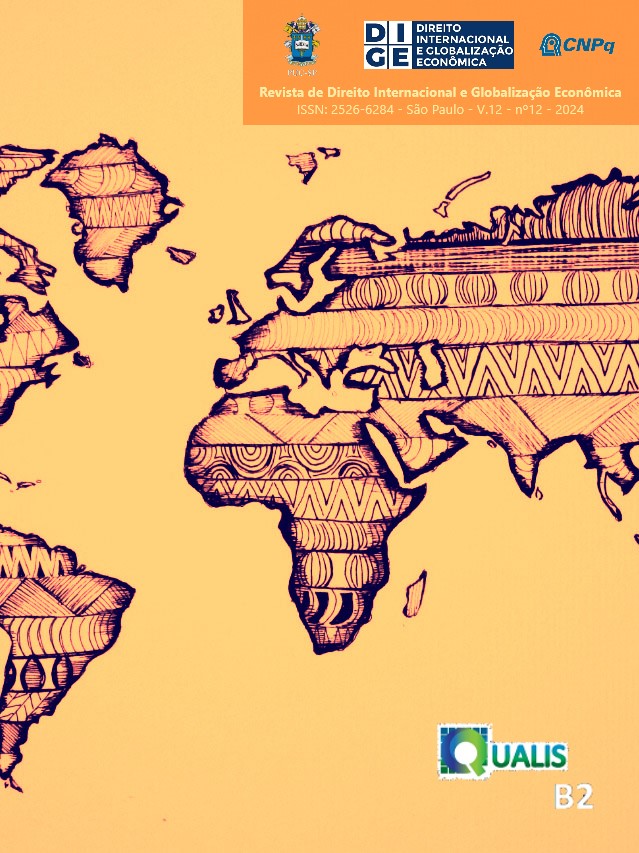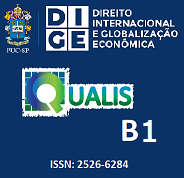A Inteligência artificial na aplicação da Stare Decisis e os Precedentes Viculantes
DOI:
https://doi.org/10.23925/2526-6284/2023.v12n12.66219Palabras clave:
Common law. Civil law. Inteligência Artificial. Precedentes.Resumen
Objetivo: A inteligência artificial (IA) é o futuro de todos os campos do conhecimento. No presente estudo analisar-se-á o uso da inteligência artificial no Poder Judiciário e, sobretudo, tentar responder a indagação: os algoritmos robôs podem exercer a atividade judicante? A problemática está em saber até que extensão essa nova fase trará segurança jurídica e isonomia. E ainda, a aplicação dos precedentes de forma obrigatória aos casos semelhantes pode violar o livre convencimento motivado nas decisões que serão proferidas pela utilização da inteligência artificial? As máquinas podem pensar? Metodologia: utiliza-se nesta pesquisa o método dedutivo, mediante pesquisa bibliográfica de livros, periódicos, artigos acadêmicos e revistas jurídicas, no qual se desenvolverá a compreensão da inteligência artificial e o princípio stare decisis na legislação brasileira. Resultados: a transformação digital das relações sociais é um fenômeno complexo, pois muda os pressupostos espaciais e temporais em que a inteligência artificial aplica o stare decisis, mediante a sua inserção gradual na civil law. É inegável que a inteligência artificial é o futuro de todos os campos do conhecimento e está cada vez mais sendo inserida no ordenamento jurídico brasileiro, que por meio da tendência do Direito jurisdicional moderno direciona-se para o efeito vinculante das decisões precedentes judiciais (doutrina dos precedentes), no qual em situações idênticas utilizará a IA, que possibilitará atender aos principais pedidos dos jurisdicionados e dos operadores do Direito, que são a celeridade processual e a maior garantia nas decisões e com a uniformidade destas em processos semelhantes. Contribuições: o presente estudo traz ao debate a importância no reconhecimento da inserção, no sistema jurídico pátrio, da inteligência artificial e suscita questionamentos profundos sobre a natureza da Justiça, a imparcialidade e a responsabilidade ética envolvidas na tomada de decisões judiciais.
Citas
ADVISE BLOG. Robôs que dão celeridade à justiça brasileira. Disponível em : https//blog.advise.com.br/robôs-que-dao-celeridade-a-justica-brasileira/. Acesso em: 16 ago. 2023.
APOCALYPSE, Sidney Saraiva. Pensamento de um Ministro do STJ. Migalhas. Disponível em: https://www.migalhas.com.br/leitores/19000/pensamento-de-um-ministro-do-stj. Acesso em: 16 jun. 2021.
ASSUMPÇÃO NEVES, Daniel Amorim. Manual de direito processual civil. 8. ed. Salvador: Juspodivm, 2016.
BARBOZA, Estefânia Maria de Queiroz. Precedentes judiciais e segurança jurídica: fundamentos e possibilidades para a jurisdição constitucional brasileira. São Paulo: Saraiva, 2014.
BRASIL. CNJ. Portal. Disponível em: https://www.cnj.jus.br/sistemas/plataforma-sinapses/. Acesso em: 16 ago. 2023.
BRASIL. STJ. Revolução tecnológica e desafios da pandemia marcaram gestão do ministro Noronha na presidência do STJ. (2020). Disponível em : https://www.stj.jus.br/sites/portalp/Paginas/Comunicacao/Noticias/23082020-Revolucao-tecnologica-e-desafios-da-pandemia-marcaram-gestao-do-ministro-Noronha-na-presidencia-do-STJ.aspx#:~:text=Notícias%20do%20STJ-,Revolução%20tecnológica%20e%20desafios%20da%20 pandemia%20marcaram%20gestão%20do%20ministro,STJ%20no%20próximo%20dia%2027. Acesso em: 16 ago. 2023.
CÂMARA, Alexandre Freitas. O novo CPC não é a panaceia de todos os males e poderá melhorar a atividade jurisdicional. Justificando. São Paulo, 2 março 2015. Disponível em: http://justificando.com/2015/03/02/o-novo-cpc-nao-e-panaceia-de-todos-os-males-e-podera-melhorar-atividade-jurisdicional/. Acesso em: 14 jun. 2021.
CONJUR. Dilema de dois juízes diante do fim do Livre Convencimento do NCPC. Revista Consultor Jurídico. São Paulo, 19 março 2015. Disponível em: http://www.conjur.com.br/2015-mar-19/senso-incomum-dilema-dois-juizes-diante-fim-livre-convencimento-ncpc. Acesso em: 16 jun. 2021.
DAVID, René. Os grandes sistemas do direito contemporâneo. 4. ed. São Paulo: Martins Fontes, 2002.
DELFINO, Lúcio; LOPES, Ziel Ferreira. A expulsão do livre convencimento motivado do Novo CPC e os motivos pelos quais a razão está com os hermeneutas. São Paulo, 13/04/2015. Disponível em: http:/com /2015/04/13/a-expulsao-do-livre-convencimento-motivado-do-novo-cpc-e-os.motivos-pelos-quais-a-razao-esta-com-os-hermeneutas/. Acesso em: 13 jun. 2021.
DIDIER JR., Fredie; BRAGA, Paula Sarno; OLIVEIRA, Rafael Alexandria de. Curso de direito processual civil: teoria da prova, direito probatório, ações probatórias, decisão, precedente, coisa julgada e antecipação dos efeitos da tutela. 15. ed. Salvador: Jus Podivm, 2020.
FGV. Inteligência Artificial no Judiciário: a mais completa pesquisa sobre o assunto. Disponível em: https://portal.fgv.br/noticias/inteligencia-artificial-judiciario-mais-completa-pesquisa-sobre-assunto . Acesso em 16 de agosto de 2023.
GONÇALVES, Vinícius de Almeida. Considerações sobre a elaboração de precedentes judiciais no incidente de resolução de demandas repetitivas no projeto do novo Código de Processo Civil. Conteúdo Jurídico, Brasília, 6 maio 2014. Disponível em: http://conteudojuridico.com.br/?artigos&ver=2.47892& seo=1. Acesso em: 14 jun. 2021.
HOLANDA FILHO, José Venilton de Almeida. O efeito vinculante dos precedentes jurisprudenciais e o princípio da segurança jurídica. Revista Jus Navigandi, Teresina, fev. 2015. Disponível em: http://jus.com.br/ar tigos/36730/o-efeito-vinculante-dos-precedentes-jurisprudenciais-e-o-principio-da-seguranca-juridica. Acesso em: 14 jun. 2021.
LOURENÇO, Haroldo. Precedente judicial como fonte do Direito: algumas considerações sob a ótica do novo CPC. Revista Eletrônica Temas Atuais de Processo Civil, [S. l.], v. 1, n. 6, dez. 2011. Disponível em: http://www.temasatuaisprocessocivil.com.br/edicoes-anteriores/53-v1-n-6-dezembro-de-2011-/166-precedente-judicial-como-fonte-do-direito-algumas-consideracoes-sob-a-otica-do-novo-cpc. Acesso em: 12 jun. 2021.
MACÊDO, Lucas Buril de. Afinal, o que é um precedente? São Paulo, 15 maio 2015. Disponível em: http://justificando.com/2015/05/15/afinal-o-que-e-um-precedente-2/. Acesso em: 16 jun. 2021.
MACÊDO, Lucas Buril de. Os precedentes judiciais, a criatividade não reconhecida e a esquizofrenia jurisprudencial. Justificando. São Paulo, 24 de abril 2015. Disponível em: http://justificando.com/2015/04/24/os-precedentes-judiciais-a-criatividade-nao-reconhecida-e-a-esquizofrenia-jurisprudencial/. Acesso em: 14 jun. 2021.
MACÊDO, Lucas Buril de. Precedentes judiciais: como podemos sentir falta do que nunca tivemos. Justificando. São Paulo, 6 de maio de 2015. Disponível em: http: //www.justificando.com/2015/05/06/os-precedentes-judiciais-no-cpc2015-o u-de-como-podemos-sentir-falta-do-que-nunca-tivemos/. Acesso em: 14 jun. 2021.
MARINONI, Luiz Guilherme. Aproximação crítica entre as jurisdições de civil law e de common law e a necessidade de respeito aos procedentes no Brasil. Revista Brasileira de Direito Processual – RBDPro, ano 15, n. 59. Acesso em:10 jun. 2021.
McCARTHY, John. What is artificial intelligence? (2007). Stanford University. Disponível em: https://www-formal.stanford.edu/jmc/whatisai.pdf. Acesso em: 16 ago. 2023.
MEDINA, José Miguel Garcia. Direito processual civil moderno [Livro eletrônico]. 3.º ed. São Paulo: Revista dos Tribunais, 2017.
NERY JUNIOR, Nelson. ANDRADE NERY, Rosa Maria. Código de processo civil comentado e legislação extravagante. 11. ed. Ver., ampl. E atual. São Paulo: Revista dos Tribunais, 2010.
RAMOS, Vinícius Estefaneli. Teoria dos precedentes no civil law e no common law. Revista Jus Navigandi, Teresina, ano 18, n. 3621, 31 maio 2013. Disponível em: http://jus.com.br/artigos/24569. Acesso em: 13 jun. 2021.
SANTO, Geruza Ribeiro do Espírito. A vinculação dos precedentes judiciais no direito brasileiro e a autonomia judicial. Conteúdo Jurídico, Brasília, 10 out. 2014. Disponível em: http://conteudojuridico.com.br/?artigos&ver=2.501123&seo=1. Acesso em: 10 jun. 2021.
SOBRINHO, Emílio Gutierrez. A doutrina dos precedentes no Código de Processo Civil. Disponível em: https://ambitojuridico.com.br/cadernos/direito-processual-civil/a-doutrina-dos-precedentes-no-codigo-de-processo-civil/. Acesso em: 14 de junho de 2021.
SOUZA NETO, Cláudio Pereira de. O novo CPC e a fundamentação das decisões judiciais. In: COÊLHO, Marcus Vinícius Furtado et al. As conquistas da advocacia no novo CPC. Brasília: OAB Conselho Federal, 2015.
SOUZA, Marcelo Alves Dias de. Do Precedente Judicial à sumula vinculante. 2. ed. Curitiba: Juruá, 2013.
STUART, Russell; PETER, Norvig. Inteligência Artificial: Uma Abordagem Moderna. Disponível em: https://aima.cs.berkeley.edu. Acesso em: 16 ago. 2023.
WAMBIER, Luiz Rodrigues; TALAMINI, Eduardo. Curso avançado de processo civil. 16. ed. São Paulo: Revista dos Tribunais, v. 2, 2016.




